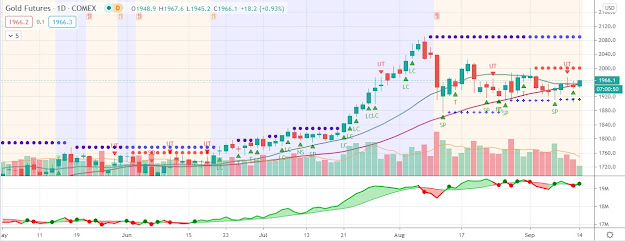Price of gold was supported by a worse than expected revision to third quarter U.S. GDP
 The gold price rebounded Wednesday morning from yesterday’s steep sell-off, by $21.74, or 0.9%, to $1,699.11 per ounce. The price of gold was supported by a worse than expected revision to third quarter U.S. GDP – which at 2.0% came in well below the 2.5% consensus estimate among economists. Silver bounced modestly in concert with the gold price, by 0.4% to $31.74 per ounce. European markets were modestly lower in Germany and France, while U.S. equity markets looked to open slightly in the red as well – with S&P 500 futures down 4.00 points, or 0.3%, at 1,186.75.
The gold price rebounded Wednesday morning from yesterday’s steep sell-off, by $21.74, or 0.9%, to $1,699.11 per ounce. The price of gold was supported by a worse than expected revision to third quarter U.S. GDP – which at 2.0% came in well below the 2.5% consensus estimate among economists. Silver bounced modestly in concert with the gold price, by 0.4% to $31.74 per ounce. European markets were modestly lower in Germany and France, while U.S. equity markets looked to open slightly in the red as well – with S&P 500 futures down 4.00 points, or 0.3%, at 1,186.75.A sharp sell-off in European markets quickly spread to the U.S. yesterday, forcing investors to raise cash by selling any and all asset classes – including those tied to the gold price. A cautious report from Moody’s Investors Service on France helped fuel the fire. The rating agency warned that a sustained rise in French bond yields combined with slower economic growth could threaten the nation’s AAA credit rating.
In the U.S., the “super committee” – an evenly-weighted panel of Congressional Democrats and Republicans – was unable to come to terms on a deficit reduction plan. The stalemate has led to growing uncertainty over the possibility of further extensions to the Bush tax cuts and unemployment benefits – two items that have provided considerable short-term stimulus to the U.S. economy.
While growing economic and political uncertainty has historically been a positive for the gold price, at present investors’ need to raise cash has trumped such bullish factors. Nonetheless, central banks remain committed to fighting deflation with a host of accommodative monetary policies that are likely to support the price of gold over the longer-term.
Gold strategists at Deutsche Bank echoed such sentiments in a note to clients on Monday. “In an environment where real interest rates are negative and the US equity risk premium is high we expect this will sustain strong private and public sector demand for gold,” the firm wrote. “However, this week has shown that gold has become more vulnerable to environments where the US dollar is strengthening.”



Comments
Post a Comment